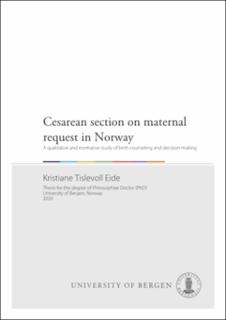Cesarean section on maternal request in Norway : A qualitative and normative study of birth counseling and decision-making
Abstract
Background: Cesarean section (CS) is a common and life-saving intervention. While lack of access is a severe problem in some parts of the world, excessive use has become a growing concern recently. In light of this, a debate has emerged concerning the acceptability of providing CSs in low-risk pregnancies conducted on the request of the mother. The literature shows that attitudes toward the phenomenon vary between healthcare professionals and across countries. Maternally requested CSs challenge such modern ethical concepts as patient autonomy, professional autonomy, shared decision- making, trust, and power. Thus, countries have developed different practices and guidelines on the matter.
Objective: The overall objective of this thesis was to develop research that can contribute to good-quality decisions for CSs on maternal request in absence of obstetric indications. This objective was achieved by establishing in-depth knowledge about i) why women request CSs in Norway and ii) how the counseling and decision-making processes were handled, and by conducting iii) a normative analysis of the premises for ethically justified decision-making in the care for women requesting CSs.
Methods: Two qualitative studies were conducted, including 17 semi-structured in-depth interviews with women requesting planned CSs at a University Hospital in Norway and six focus-group discussions with 20 healthcare professionals (nine midwives and 11 obstetricians) working in the same hospital. Interviews were taped, transcribed, and analyzed according to systematic-text condensation, which is a method for cross- case analysis of qualitative data. A normative analysis was carried out based on knowledge gained from the qualitative studies and reading of the scientific literature. We drew upon theories about autonomy, power, trust, and risk in the professional-patient relationship in order to explore how to promote ethically justified decisions for planned CSs in absence of obstetric indications.
Results: The first study revealed that women had individual and nuanced reasons for wanting a planned CS. Their previous birth and postnatal experiences, self-perceived risks for an emergency CS, or deep-seated fear of giving birth all influenced their decision. Rarely, obstetricians claimed to also experience requests that in their opinion lacked significant fear or well-grounded reasons. This indicates a need for an individually targeted counseling approach. The second study found a prominent culture advocating for vaginal delivery among healthcare professionals and also among women, even though they requested a planned CS for different reasons. There were differing attitudes and approaches among healthcare professionals toward CS on maternal request. Women were also divided in their views on maternal decision-making entitlements, but the majority did not support complete maternal choice and opted for a shared decision-making process. Midwife-led counseling resulted in high satisfaction among the women.
The normative analysis revealed that although a woman may not be entitled to demand a planned CS, she should take part, and be heard, in the decision-making process. Due to the structural inferiority of women in terms of power and knowledge, as compared to healthcare professionals, initiatives to limit this power through shared processes of decision-making are needed in order to make these processes trustworthy for women.
Conclusion: Although most of the women in this study had nuanced and well-grounded reasons to request CSs, women and their healthcare professionals had differing attitudes toward the decision-making process. This highlights the need for an individual counseling approach as well as for standardized guidelines justifying the use of power among healthcare professionals in order to assure that women who need a planned CS can experience a truly shared, honest, and transparent decision-making process.
Has parts
Paper I: Eide KT, Morken NH, Baeroe K: Maternal reasons for requesting planned cesarean section in Norway: a qualitative study. BMC Pregnancy Childbirth 2019, 19(1):102. The article is available at: https://hdl.handle.net/1956/23662Paper II: Eide KT, Morken NH, Baeroe K: Tensions and interplay: A qualitative study of access to patient-centered birth counseling of maternal cesarean requests in Norway. Midwifery 2020, 88:102764. The article is available at: https://hdl.handle.net/11250/2728146
Paper III: Eide KT, Bærøe K: How to reach trustworthy decisions for cesarean sections on maternal request: a call for trust and beneficial power. Journal of Medical Ethics 2021, 47(12):e45. The article is available at: https://hdl.handle.net/11250/2727860

